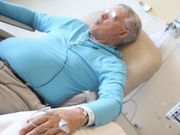Predictive model for older adults with cancer validated in independent cohort of 250 individuals
WEDNESDAY, May 25, 2016 (HealthDay News) — A predictive model for chemotherapy toxicity has been validated for older patients with solid tumors, according to a study published online May 16 in the Journal of Clinical Oncology.
Arti Hurria, M.D., from the City of Hope Comprehensive Cancer Center in Duarte, Calif., and colleagues developed a predictive model for chemotherapy toxicity in a cohort of 500 patients aged 65 years or older, with a solid tumor, who were scheduled to receive a new chemotherapy regimen. The model consisted of geriatric assessment questions and other clinical variables. The model was externally validated in an independent cohort of 250 patients (mean age, 73 years).
The researchers found that 58 percent of patients experienced toxicity of grade 3 or higher. There was an increase in the risk of toxicity with increasing risk score (36.7, 62.4, and 70.2 percent for low, medium, and high risk respectively; P < 0.001). The area under the receiver-operating characteristic curve was 0.65, which did not differ significantly from that of the development cohort (0.72; P = 0.09). No correlation was seen for Karnofsky Performance Status and chemotherapy toxicity (P = 0.25).
“This study externally validated a chemotherapy toxicity predictive model for older adults with cancer,” the authors write. “This predictive model should be considered when discussing the risks and benefits of chemotherapy with older adults.”
Several authors disclosed financial ties to the biopharmaceutical industry.
Copyright © 2016 HealthDay. All rights reserved.








